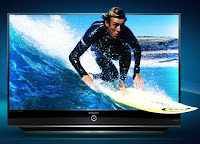Addiction is also referred to as well. Writing, searching, modifying, buying, exploring, learning; people spend countless hours on the computer. Computers deter people from spending time with family, friends, but in general, other humans. Dooling refers to people storing everything on their computers. Memos, music, documents, photos; people’s lives are stored on their computers. Encountering a tiny gliche with computer hardware can destroy a big chuck of your life if you did not create a back-up for your hardrive. Coincidentally, I had undergone this tragedy recently yet to a minor degree. With hopes of recuperation, my hardrive is in the freezer as we speak. I feel as if I’ve been robbed. Thankfully, my hardrive is relatively new so only a couple months worth of files had been destroyed.
Dooling further ponders. “Is the computer just our latest tool or are we worshipping it?” He notes that people acquire relationships with gadgets and computers just as they do with their boats, cars, and guns. They will even name their widgets which further expresses their love affair with technology. But, the only significant difference between computers and, for example, cars is that computers evolve and advance at a MUCH greater rate. Ray Kurzweil, futurist, is later introduced. He explores technological acceleration and emphasizes on “Moore’s Law.” The concept of Moore’s Law explains that computer’s memory, chips, motherboards, and hardrives are growing exponentially every two years; each breakthrough arrives twice as fast as the previous. Computers switched from megabytes to gigabytes in a matter of five years. It took 14 years for the personal computer to evolve into the World Wide Web. Our iPods and phones are minimizing and advancing constantly. Google is continually improving at guessing what we are thinking to write even before we have even finished writing it. Soon we might all be communicating via teleporte system, projections of 3D-image actual life-sized people. We, humans, are everything but close to the rate at which technology advances. Our biological evolution rate is snail slow; it will take nearly 4 million years for our brains to simply triple. Comparing such rates is a little frightening. Yet, these rates can work to human’s advantage. Technology staying under our control could then perfect life for humans, but would it really be that great? Technology could then give us whatever we need and desire. Values of dreams and pleasures would soon deter. How many times can one win at playing the slot machine or lottery? Could immortality become an option? What would flawless humans wander the earth pointlessly for? Perhaps, technology will not abide our rules, regulations, wants, and needs. What if a billion super computers combine with one another and gang up on us humans instead? Similarily, isn’t this already occurring already with the internet?
Such mentality might bring about disturbance or anxiety. Yet if that is the case, people should resort to reading poems, visiting art galleries, going to plays, and/or listening to music. Computers lack creativity and soul. People need to remember that although computers might become a lot smarter than us, they still have no ambitions, appetites, emotions, or destructive impulses. Dooling speculates that a computer does not have intelligence or consciousness hence scientists have not yet invented one with sapient qualities. This ideology coincides with that of Mentor Cana's in his Critique of McLuhans' Technological Determisism Viewpoint or Lack of One Thereof. Mainly,
The concept of “technological singularity” is later introduced. Singularity, although a mind-boggling and complex subject coined by Vernor Vinge in 1982, is the future of technology and its effect on human affairs which is assumed by technological experts to take place sometime before 2030. It is a technological explosion said to most likely be beyond our comprehension. Singularity is the ideology that once scientists do create super computers with even remote human qualities, that of intelligence and consciousness, these machines will start constructing more of themselves on their own. Technology would advance at ten times the rate then it had, hence the super computers are a lot smarter than humans.
Apparently, humans will in fact become the second smartest species on the planet. But, will singularity lead to computers taking over? Dooling suggests that no matter what happens, it is apparent that humans and computers will inevitably become even more closely intertwined. He strongly recommends that ordinary people learn the basics of programming (Html, Java, Linda) to prepare for this upcoming technological phenomenon. The author makes a rather comical comparison between Americans and the rest of the world. He explains that in America many people will modify or add songs to their MySpace or Facebook page and call themselves “programmers.” Yet a real example of programming is of the practically homeless poor boy of Estonia. The boy builds a Linux computer out of spare pieces from a salvage bin. He will teach himself Html and online commerce, and use these tools to defraud Americans. This is a perfect example of Charles Darwin’s "survival of the fittest." Dooling makes it clear that it is simply up to us. Do we really want to be blindly taken over by technology? Or do we want to have some say in what happens within this technological phenomenon and in our future?
Dooling, Richard. Rapture for the Geeks. New York: Harmony Books, 2008. Print.





